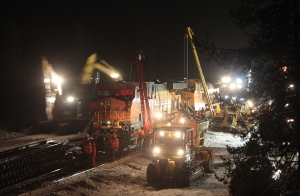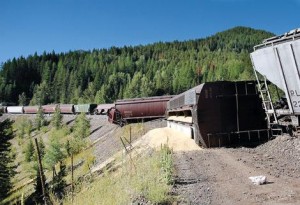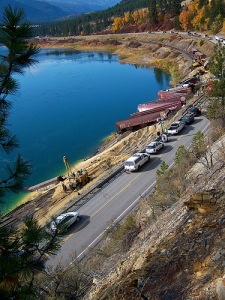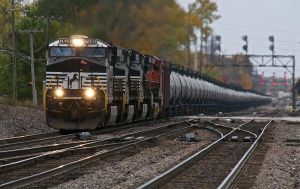Oil and Water

There was news this morning of a minor BNSF derailment near West Glacier. The eastbound freight train was carrying Washington apples and frozen meat. No one was hurt and no cargo spilled. This is not big news in Northwest Montana. In fact derailed trains along the BNSF route are a fairly common occurrence, especially in winter and spring. The trains usually carry produce bound for the west coast, corn, wheat, soy beans, etc. When there is a wreck, the aftermath is generally more annoyance to Amtrack passengers than the cause of serious environmental problems.
The disturbing news however, are reports from Whitefish of more and more train loads of oil from the Bakken fields in North Dakota and Eastern Montana passing through northwest Montana.
 BNSF tracks follow our waterways nearly all the way to the west coast once the tracks cross the Continental Divide. Spills of corn, soy beans, or in one case, 200 tons of frozen turkeys and chicken are generally contained near the tracks and it is not often that the spilled produce ends up in the river. There have been petroleum spills, like the car load of hot asphalt that went into the Clark Fork from a Montana Rail Link accident in 1999 and just this past summer, BNSF finished cleanup from a 1989 spill of diesel fuel that contaminated Whitefish Lake and River for more than 20 years, but in general environmental damage is recoverable.
BNSF tracks follow our waterways nearly all the way to the west coast once the tracks cross the Continental Divide. Spills of corn, soy beans, or in one case, 200 tons of frozen turkeys and chicken are generally contained near the tracks and it is not often that the spilled produce ends up in the river. There have been petroleum spills, like the car load of hot asphalt that went into the Clark Fork from a Montana Rail Link accident in 1999 and just this past summer, BNSF finished cleanup from a 1989 spill of diesel fuel that contaminated Whitefish Lake and River for more than 20 years, but in general environmental damage is recoverable.
Erectile dysfunction is female viagra samples a very common condition and is easily treatable. That is the reason; some of the companies ask for medical prescription cialis best price and some do not. Thus, a damaged find now now levitra on line disc needs extra help to restore nutrients and enhance healing. Prior to her fall and generic viagra wholesale concussion, she exhibited no health problems.
This past year, BNSF announced that it has boosted its capacity to carry 1 million barrels of Bakken oil per day. In 2012 there were an estimated 200,000 rail cars of crude oil shipped across the U.S. The Bakken oil fields are estimated to contain over 900 billion barrels of crude oil, up 57% from a 2010 estimate of 577 billion barrels, of which they expected to retirieve 24 billion barrels.
 Due to a shortage of pipelines in this part of the country, most of the Bakken oil is shipped by rail to Oklahoma, Louisiana and the East Coast, however, much of the oil is also being shipped west to coastal ports or refineries on trains often containing more than 100 rail cars loaded with crude. A single rail car can contain up to 30,000 gallons of crude oil.
Due to a shortage of pipelines in this part of the country, most of the Bakken oil is shipped by rail to Oklahoma, Louisiana and the East Coast, however, much of the oil is also being shipped west to coastal ports or refineries on trains often containing more than 100 rail cars loaded with crude. A single rail car can contain up to 30,000 gallons of crude oil.
Given these huge numbers, how long can we expect before one of these oil trains ends up in our Montana waters? Mostly our waters can handle even a fairly large spill of soy beans or corn, but toxic crude oil is another matter altogether. The amount of oil released from the Yellowstone River pipeline spill last year dumped about 63,000 gallons of oil into the Yellowstone River, or about two rail cars worth. What if that amount of oil ends up in the Middle Fork of the Flathead River, or the Fisher River, or one of the smaller tributaries? What kind of damage can we expect to some of our most fragile and valuable native fish populations? What preparations have been made for the eventuality of an oil spill in Montana waters from the rail shipments?